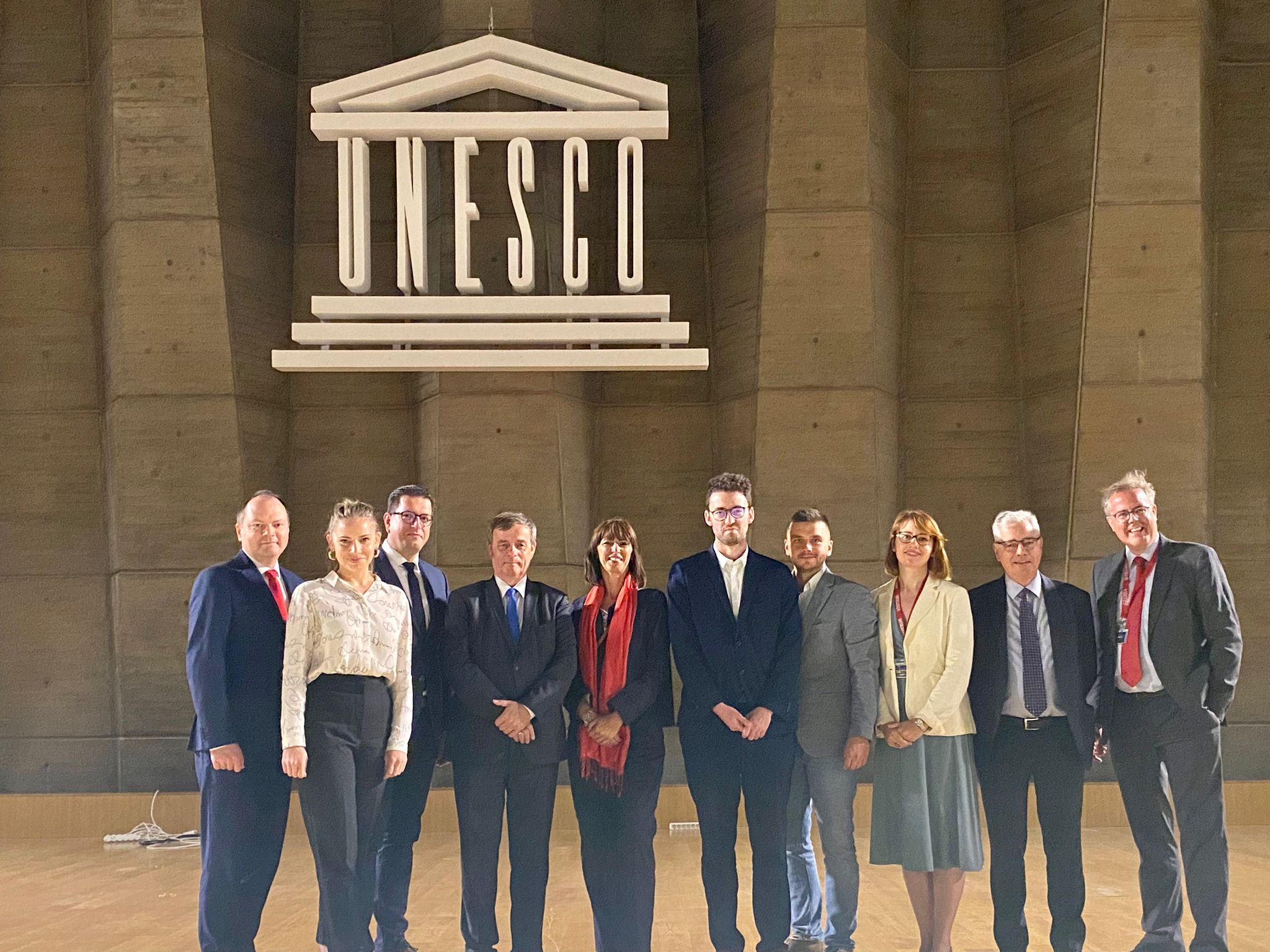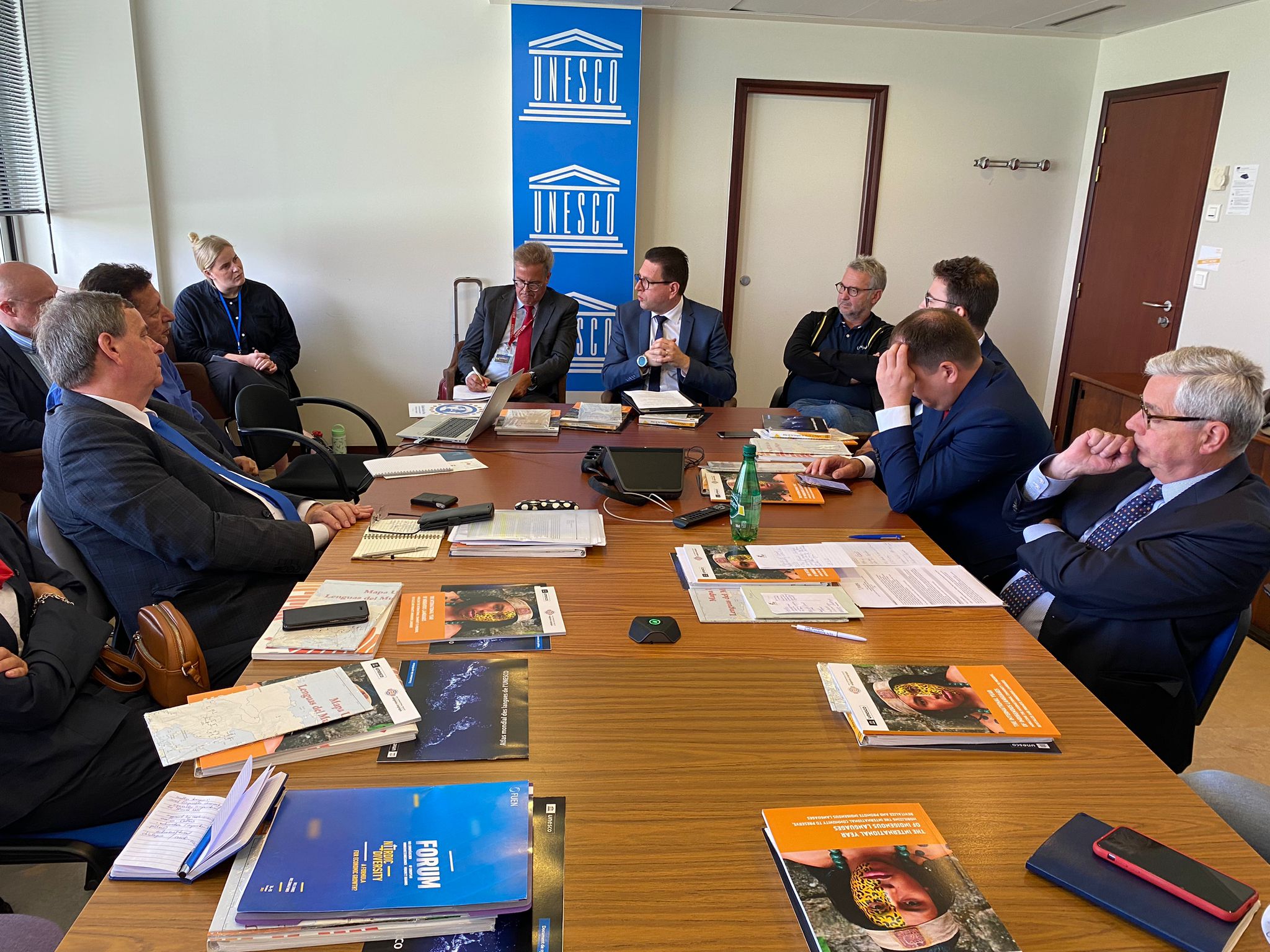
European Dialogue Forum visits UNESCO and the French National Assembly
06.07.2023"To contribute to the maintenance of peace and security through the promotion of cooperation among peoples in education, science and culture" - this is the guiding principle of UNESCO. At FUEN, we also work and act according to this principle every day, so that an even closer cooperation and exchange with the specialised agency of the United Nations seems to make sense to us. On 5 July, the European Dialogue Forum (EDF) of FUEN travelled with an eleven-member delegation to the UNESCO headquarters in Paris, France, to discuss common goals and exchange ideas with representatives from the fields of culture and language.
The focus of the talks was on strengthening cooperation in relation to the preservation of linguistic diversity. With the World Atlas of Languages, UNESCO has developed a valuable tool that documents 2000 languages from 122 countries and thus linguistic diversity, but at the same time shows declines. Language policy, the use of mother tongue and education were identified as areas where the organisations could work together.

Jaco du Toit, Head of UNESCO's Universal Access to Information Division, highlighted the importance of FUEN member organisations' contributions to the UNESCO World Atlas of Languages. "FUEN member organisations play a crucial role in reviewing this tool and ensuring that information on their minority languages is well documented," said Jaco du Toit.
FUEN President Loránt Vincze pointed out that, unfortunately, minorities have little influence on UNESCO's work, as states make the proposals, e.g. for UNESCO's Intangible Cultural Heritage List, and minority proposals are often not taken into account.
The meeting also included a presentation of FUEN's work and projects, while UNESCO representatives presented their programmes and plans for the International Decade of Indigenous Peoples 2022-2032. Jaco du Toit also pointed out the many opportunities for cooperation between the two organisations, including specific projects to support the preservation of linguistic and cultural diversity. Prospects for cooperation emerged especially in the field of youth work.
"A minority-friendly attitude of regional and national governments of states with linguistic diversity are the be-all and end-all," stressed Jens A. Christiansen, EDF Chair. The FUEN European Dialogue Forum plays an important role in promoting good models for successful cooperation and dialogue between minorities and majorities.
EDF members also drew UNESCO's attention to the need to intensify cooperation at the level of direct funding of minority NGOs by UNESCO. Direct funding is crucial in cases where national governments do not see linguistic and ethnic diversity as an asset.

The FUEN delegation then met with members of the French National Assembly representing Corsican and Breton communities. The co-chair of the Minority Intergroup in the European Parliament, François Alfonsi, also took part. The discussion focused on mechanisms to strengthen the political participation of minorities in France and in Europe and on ways in which the European Dialogue Forum can promote the political participation of minorities.
Another topic was the challenges regarding the identity and rights of minorities resulting from the formal non-recognition of minorities in some states, e.g. France. Finally, it was discussed how to proceed with the endorsement of the Minority SafePack in France as part of the implementation of the initiative at national level.
.png)
The FUEN delegation consisted of:
- Mr Loránt Vincze, President of the Federal Union of European Nationalities, MEP, Romania
- Mr Jens A. Christiansen, EDF Chairperson, South Schleswig Association (SSF), Germany
- Mr Andor Barabás, President of the Youth of European Nationalities (YEN), Romania
- Ms Dóra Emese Szilágyi, Democratic Alliance of Hungarians in Romania (RMDSZ), Romania
- Ms Olivia Schubert, National Self-Government of Germans in Hungary (LdU), Hungary
- Mr Volomydyr Leysle, Council of the Germans of Ukraine (RDU), Ukraine
- Mr Bernard Gaida, Association of German Social Cultural Societies in Poland (VdG), Poland
- Ms Kateryna Haertel, Political Officer & Project Coordinator, FUEN Brussels
- Mr Johan Häggman, Policy advisor, FUEN Brussels
- Mr. Jean Faivre and Mr. Bernard Faivre, “Unser Land”, FUEN MO
COMMUNIQUÉ DE PRESSE
- New secretariat in the Polish parliament supports national and ethnic minorities
- FUEN calls for the inclusion of the Ladin language at the 2026 Winter Olympic Games
- FUEN Urges UN Special Rapporteur to Advocate for a Coherent EU Minority Protection Framework
- FUEN wishes you a peaceful Christmas season, restful days and a bright, hopeful start to the new year!
- FUEN calls on the EU to act over systematic ethnic-based land confiscations in Slovakia
- Women of Minorities conference in Budapest calls for structural change to ensure equal political participation of minority women
- FUEN President Olivia Schubert at UN Forum on Minority Issues in Geneva
- "Laboratory of Peace": 28th Seminar of Slavic Minorities held in European Capital of Culture Gorica/Gorizia
- Equality in Political Participation and Representation: Third “Women of Minorities” Conference to Be Held in Budapest
- FUEN Working Group on Education discusses challenges and future of minority schooling in Europe














